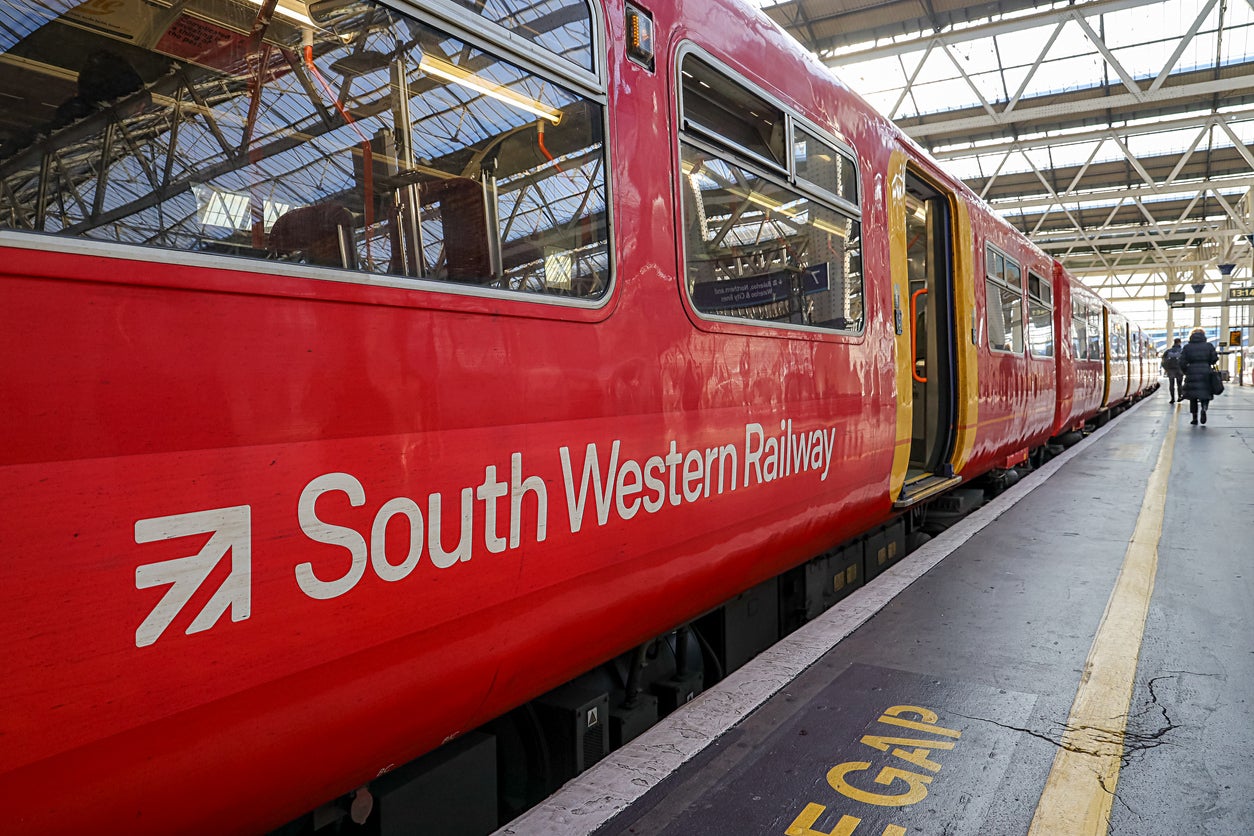Why are the train strikes happening?
Journeys by train are set to be disrupted on Tuesday, Thursday and Saturday of this week - but why are rail workers walking out?

Your support helps us to tell the story
From reproductive rights to climate change to Big Tech, The Independent is on the ground when the story is developing. Whether it's investigating the financials of Elon Musk's pro-Trump PAC or producing our latest documentary, 'The A Word', which shines a light on the American women fighting for reproductive rights, we know how important it is to parse out the facts from the messaging.
At such a critical moment in US history, we need reporters on the ground. Your donation allows us to keep sending journalists to speak to both sides of the story.
The Independent is trusted by Americans across the entire political spectrum. And unlike many other quality news outlets, we choose not to lock Americans out of our reporting and analysis with paywalls. We believe quality journalism should be available to everyone, paid for by those who can afford it.
Your support makes all the difference.Travel across the UK is set to be disrupted for much of this week as the Rail, Maritime and Transport (RMT) union launches the biggest strike to hit the British rail network in 30 years.
Travellers to events such as Glastonbury festival, the English vs New Zealand cricket match in Leeds and major gigs by the Rolling Stones and Elton John are having to re-think rail journeys and look into alternative transport.
Though there are only three official strike days, Network Rail has warned passengers to expect disruption across the whole week, as the knock-on effects of the 24-hour walkouts bleed into the days that follow.
But what is the reason for the disruption, and why are train workers striking?
Here’s everything we know so far.
Who is going on strike?
Members of the RMT union, who voted on industrial action in late May. In the ballot, 89 per cent of those who responded backed the strikes.
Some work for Network Rail - which controls the infrastructure of the UK’s railways - while others work for 13 individual train operators:
- Avanti West Coast
- c2c
- Chiltern Railways
- CrossCountry
- East Midlands Railway
- Greater Anglia
- GWR
- LNER
- Northern
- Southeastern
- South Western Railway
- TransPennine Express
- West Midlands Trains
The union says some 40,000 rail workers in total will walk out on the three strike days in June.
Employees include catering staff, guards, engineering workers and signalling staff.
The walkouts will wipe out huge swathes of rail network, particularly in Wales, Cornwall, Scotland and parts of the North of England.
A skeleton network will operate on the strike days, with trains starting later than usual at around 7.30am and finishing earlier at around 6.30pm.
In addition, London Underground workers are set to strike for 24 hours on 21 June, meaning much of the Tube network will be closed on Tuesday.
What has the union said about the industrial action?
The union says it is protesting government cuts, working conditions and unsatisfactory pay rises against rising inflation.
On 18 June, the RMT union released a statement saying: “In the past few weeks, discussions have been taking place at senior level with Network Rail, Train Operators and London Underground.
“Despite the best efforts of our negotiators no viable settlements to the disputes have been created.
“It has to be re-stated that the source of these disputes is the decision by the Tory government to cut £4bn of funding from our transport systems - £2bn from national rail and £2bn from Transport for London.
“As a result of this transport austerity imposed by the government, the employing companies have taken decisions to:
- Savage the Railway Pension Scheme and the TFL scheme, cutting benefits, making staff work longer, and poorer in retirement, while paying increased contributions.
- Thousands of job cuts across the rail networks.
- Attacking terms, conditions and working practices in a form of internal fire and re-hire.
- Cutting real pay for most of our members through lengthy pay freezes and below RPI inflation pay proposals.”
It says: “We want a transport system that operates for the benefit of the people, for the needs of society and our environment – not for private profit.
“Every worker in Britain deserves a pay rise that reflects the cost-of-living crises. All working people should have the benefit of good negotiated terms, conditions, working practices and occupational pensions that will ensure their living standards in retirement.”
RMT union leader Mick Lynch says the union has rejected a Network Rail offer of a 2 per cent pay rise with a further 1 per cent increase linked to job cuts. The union insists that a pay rise should reflect current inflation rates and the higher cost of living.
What have the train operators said?
Steve Montgomery, group chair of the Rail Delivery Group, representing train operators, said: “No one wins in the event of a strike. Staff lose pay, the industry loses vital revenue making it harder to afford pay increases, and passengers and businesses are disrupted.
“While we will keep as many services running as possible, sadly if this action goes ahead, significant disruption will be inevitable. We therefore urge passengers to plan their journeys carefully and find alternative ways to travel during the strike period where possible.”
“Instead of striking, we need the RMT leadership to work with us to secure a deal that is fair to our staff, fair to our passengers and fair to taxpayers,” he has said.
Meanwhile, Network Rail’s chief negotiator, Tim Shoveller, said: “I’m serious about trying to find a solution and work out a compromise that gives our people a decent pay rise, but it has to be affordable for taxpayers and fare payers.
“Our offers have so far been rejected, with union demands far from being affordable. We will continue to talk and to try and find a way through and avert this needless and damaging strike.”
What has the government said?
Ultimately the government will decide what can be offered. The transport secretary, Grant Shapps, said: “It is incredibly disappointing the RMT have decided to take action that could drive passengers away from the rail network for good.
“The pandemic has changed travel habits – with 25 per cent fewer ticket sales and the taxpayer stepping in to keep the railways running at a cost of £16bn, equivalent to £600 per household. We must act now to put the industry on a sustainable footing.”
Amid calls for the government to step in, Mr Shapps told press it was not ministers’ place to intervene.
“In any pay discussion, in any negotiation over terms, over in this case modernisation, it’s always the employer and the union who need to get together to speak,” he said.
Meanwhile, the Opposition has accused the government of wanting the strikes to go ahead to “stoke divisions”, and “pouring petrol on the fire” by refusing to intervene.
Could the strikes be averted?
With the walkouts set to start tomorrow, there is almost no chance the industrial action will be averted at this stage.
Network Rail bosses are set to hold last-ditch talks with the RMT on Monday, but union bosses indicated at the weekend that there was little prospect of a breakthrough.
A Network Rail representative said: “We are in the room talking and there has been some movement. The chances are slim, but there is some hope.”
While the government says it wants to avoid a strike, ministers such as Grant Shapps have been scathing and dismissive of the union’s concerns and motives.
Mr Shapps has said calls to involve government in the strike negotiations are a “stunt”, calling the action “a huge act of self-harm” and accusing the union of “gunning for this strike”.



Join our commenting forum
Join thought-provoking conversations, follow other Independent readers and see their replies
Comments